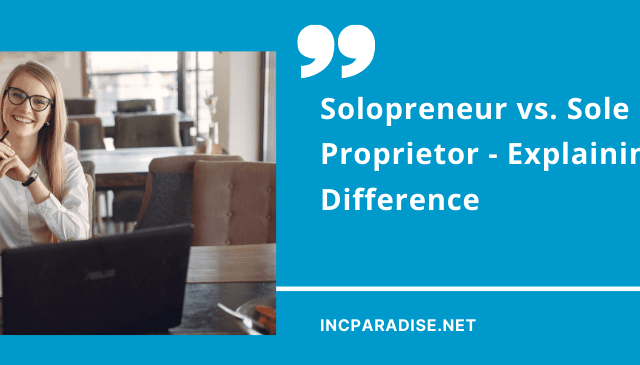Forming a company can be a great new venture for every entrepreneur out there. But there is one question that comes up in everyone’s mind when they are going to be doing it alone – which structure is the best one for forming your business? Are you going to be a sole proprietorship or a solopreneur? In fact, did you even know that these two are different. There is a lot that you have to learn about the solopreneur vs sole proprietor. Each has its own advantages based on what you want and need. This article will explain it all to you.

Solopreneur vs. Sole Proprietor
Solopreneurship is a rising phenomenon. It is when a person develops and operates a company without any employees so that they can earn passive income. On the other hand, a sole proprietorship is when a person starts and operates a company while assuming all the risks that come with it. In other words, a sole proprietorship is when a person starts a company alone but then acts as a manager in their own business. Let us understand each better to then look into their differences in details.
What is Solopreneur?
Solopreneur is the blend of two words – solo and entrepreneur. This means that it is an entrepreneur who works alone. These kinds of people do not rely on anyone and strive to monetise their business on their own. There are certain times where a solopreneur may have to delegate particular tasks. This is normally a temporary thing and can be done by outsourcing. In short, solopreneurs work with people on a specific job but do not hire them as an employee.
Moreover, it is not uncommon for entrepreneurs to begin with business as a solopreneur and then build a team as needed and as the company grows. Just to be clear, a solopreneur might employ freelancers or contractors, or even have a small team. But the business, the work, and the mission of the Solopreneur all relies on one person’s vision and brand. Moreover, the most common business structure that a solopreneur opts for includes an LLC or operating a sole proprietorship.
Types of solopreneurs
To understand solopreneurs, it is important to know that there are different types that fall under this. Solopreneurs are people who value their autonomy and flexibility. They are people who want to guide their careers by the kind of work they want to be doing, and not by listening to a manager and working. Here are the four types of solopreneurs that you can choose to become:
- Freelancer: A freelancer is a person who offers a service. They usually sell their time by the hour or price by the project. These professionals usually sell their services using a proposal. And they build their audience by talking about what they can offer and sharing case studies of their work.
- The Maker: This is a person who produces a product, and then sells them using their website. In short, they create good systems and look for new audiences by nurturing advocates and champions of their products.
- Thought Leader: This is a person who shares ideas to an audience of people who then gain benefit from learning about these ideas. They grow their audience by creating programs, courses, speeches, and books that would deliver their intellectual property.
- Agent: The agent is a person who sells on behalf of others. They have a brand that is a subsidiary of a parent brand. And they connect with their audience using their overbrand name. So, commissioned salespeople, affiliate marketers, and insurance agents are solopreneur examples.
In short, no matter whatever you do or identify as, one thing about being a solopreneur is that there is constant change in the work. These kinds of entrepreneurs are the most agile. They can easily remake themselves within a few moments and have the capability of turning into something new.
What is Sole proprietor?
As per the IRS, a sole proprietor is a person who owns an unincorporated business by themself. So, if you start a business and do not choose to incorporate it, the IRS would consider you to be a sole proprietor by default when it comes to tax time. And even though the sole proprietorship does not cost you any money as you will not be incorporating legally, there is no legal protection as you and the business are considered to be one. But you will need to get the sole proprietor registration done to let the government know you have a business.
In short, if someone sues your company, you will be sued too and would be responsible to pay for all the debts. This means that you can also lose your home and other personal belongings just to pay off. Moreover, a sole proprietor can easily hire employees and freelancers, as opposed to the solopreneur.
Differences Between Soloprener’s and Sole Proprietors
From the definition above, it has become slightly clear that solopreneur vs sole proprietor are not the same. Here are the main differences between the two that you should know about:
#1 Sole proprietor’s may hire employee but not Solopreneurs
Solopreneurs do not hire employees; instead, they connect and work together with other solopreneurs or companies. Their work is usually a contractual kind of work. On the other hand, sole proprietors can easily hire full time employees. The disadvantage of hiring someone, from a business point of view, is that you will then have to file for the payroll taxes for each employee. The sole proprietor would also need to give the W2 forms for each employee after the completion of each income year.
Every year, these documents need to be submitted to the IRS. Yes, employees help your business grow. But it also brings in a lot of expenses and documentation work. For a solopreneur, they do not have such issues. If they need some help, they can get into a contract with the other professional or company and get the work done. This just makes things easier for them as they do not need to worry about the documentation and/or any filings.
#2 Business focus
The people who end up being solopreneurs are usually not planning to be entrepreneurs. They start off their business to offer only a specific kind of service/product and are focused on building a steady customer base that would help them bring in profits to their business. These people are not looking to expand. And when a person does not want to expand, it makes the business manageable for the one person who intends to continue running the things solo. On the other hand, a sole proprietor is a person who might expand their business and grow into different branches by offering multiple products and services.
#3 Business structure
Another difference in the solopreneur vs sole proprietor is in how their business structures run. Although both the sole proprietorship and solopreneurs are considered to be an unincorporated businesses. As a sole proprietorship, you do need to register your business with the government and that is it.
You are the business, and all the liabilities and debts of the business fall on you. And once you bring in members into the company by hiring employees, you would then have to incorporate as an LLC or corporation. On the other hand, a solopreneur is not a business structure like the sole proprietorship. They can work without incorporating or can also incorporate the company as a single-member LLC.
#4 Difference in taxes
Business income for both a solopreneur and a sole proprietor passes through to their personal taxes. Each files a Schedule C and attaches it to their personal taxes. And each needs to pay any estimated taxes and self-employment taxes.
However, if you’re a solopreneur who decides to form your business as an LLC and not a sole proprietorship, you can potentially reduce your self-employment taxes by electing to be treated as an S Corp at tax time. A solopreneur operating with an LLC may also find it easier to locate common business deductions due to the required separation of personal finances and business finances.
#5 Need of EIN
An EIN is an Employee Identification Number. It’s similar to a Social Security number for your business. A solopreneur with an LLC should apply for an EIN to keep their Social Security number off of important documents and contracts.
While a sole proprietor does not necessarily need an EIN, you can apply for one to protect your Social Security number from clients and vendors should they need your information for tax purposes. If you hire employees as a sole proprietor or a solopreneur LLC, you need to obtain an EIN. Having an EIN is also helpful in both instances if you want to set up a dedicated business bank account or apply for a business credit card.
Solopreneur or Sole proprietor – Which one should I choose?
People are opting to stick with solopreneurship where they are the only person running their business. Around 41.8 million adults across ages, skill sets and income groups worked as a solopreneur in 2019. In the case of sole proprietorship, there are 23 million people who are in this classification — that’s 73 percent of total businesses in the U.S. And 60.1 percent of these small businesses are home-based.
There are reports that show people who are working independently as freelancers, contractors or solopreneurs are contributing around 6.2 percent of the U.S. GDP, or $1.3 billion to the U.S. economy. And running your own business isn’t just for early in your career — it can be a solid option to take you through to the end of your career. Solopreneurs seem to be more comfortable with their retirement plans. Out of the people surveyed in 2019, only 28 percent said that retirement planning is a challenge for them, which is down from 42 percent back in 2016.
Which is right for you?
Operating as a sole proprietor or solopreneur without the protection of a legal business structure may be okay if you are operating a small side business and want to avoid the paperwork and compliance that comes along with setting yourself up as a solo LLC. However, you are risking your personal finances if you are ever faced with a lawsuit or run into financial difficulties with your business.
Choosing to operate as a solopreneur with an LLC business structure in place will give you legal protection and more legitimacy and credibility in the eyes of your clients. An LLC also gives you more tax options, such as electing to be taxed as an S Corp, potentially reducing your self-employment taxes. And don’t worry — even if you consider yourself a solopreneur, you can easily expand your LLC to include employees or other business partners down the line.
Need any Assistance in Forming Your Business?
It is common for many to ignore the difference between the solopreneur vs sole proprietorship. But it is important to know it. With the details cleared now, you can move ahead and have your business started as either one of these. If you need help in registering your company, IncParadise can help you with it. Our team can also help you with the annual report filing, EIN assistance, mail forwarding and many other services.






